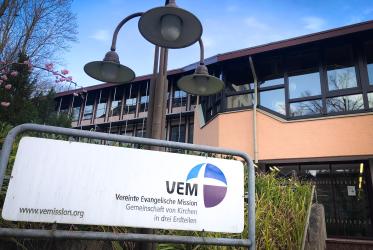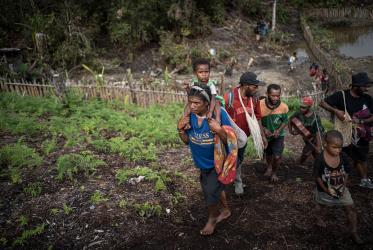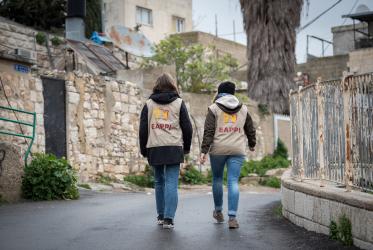Protecting peoples' lives and human dignity / Churches responding to new threats to peace and human security / Building hospitable communities: responding to migration / Public life, religion and politics
12. Walking in truth, speaking with power
From the prophet Isaiah to the pastor Bonhoeffer, from Esther in ancient Israel to the Mothers of Plaza de Mayo in Argentina of our day, prophets are real and inspiring. They are raised up in honour at regular intervals in the Bible. God's promise of a new heaven and a new earth owes something to their labors. Yet most believersno matter how committed to God's justicewould not call themselves prophets or think of themselves as prophetic people. Prophets are unusual, remote and rare people. The admonition to "Speak Truth to Power" is well-known, but in daily life most followers of Jesus live silently, feel quite powerless and remain deeply challenged by how to deal with power and by whether those who try to do so actually even make a difference.
What is more, the prophet Samuel spoke straight to King Saul. There is no mention of media, market forces or international alliances coming between them, however clearly the relational dimension of power is highlighted. In our world, power is grafted into global structures of influence, wealth, information and privilege. It is defined by image and prerogative. Old dynamics of gender and race are reasserted in new patterns of oppression. Power is mediated and projected across entire regions and cultures. Its sources are more impersonal than ever before, yet its impact is more acutely personal than in the past.
The last decade has witnessed deep changes in political power. From a bipolar world to a single superpower, with new possibilities for countries such as China, Russia and India playing key roles. At the same time, locally, nationally and internationally, civil society is becoming increasingly active in expressing its power and, in some situations, influencing global policy directions. Individual churches and related organizations mount highly developed advocacy programs and sustain them against strong odds. Churches united in advocacy have made the WCC a moral compass in an international system that is sometimes confused and often short of viable answers.
Still, one prophet, the Son of God, stands at the door of the human heart and speaks to the halls of earthly power: I am the Truth. Blessed are the poor, and also the meek. Whatever you do to the least of these you do to me. Loose the chains of oppression. Let justice flow. Walk humbly with God. Do we hear these words of hope and take heart?
In the first session participants will discuss the nature of public power in the world today and set the stage for further analysis. They will examine power at different levels, from local to global, from bipolar to multilateral and also identify new forms of power.
The second session will examine the churches' ability to walk in truth and speak with power. How can we compare our situation with the biblical narratives about prophetic action? Over against a more integrated and more complex world, what are the churches' greatest strengths for addressing and influencing public and corporate authorities?
The third session will discuss the balance between actions to denounce, to offer hope and to live in hope. Participants will hear and discuss testimonies and will be asked to choose gifts of God that they are receiving at this Assembly and will take back to their churches as a dynamic expression of ecumenical action in the world: churches speaking truth to power as a critical, moral, constructive and united witness in a world that is being transformed by the gracious love of God.
13. Protecting peoples' lives and human dignity
The changing context of the world after the end of the Cold War poses new threats to human rights and human dignity. The weakening of the nation-state, as a result of the globalization process, the increased number of conflicts within rather than between states, have all meant increased violence against innocent civilian population, women and children and threats to their dignity and rights, both civil and political and economic, social and cultural.
Work for justice is at the core of the biblical message. The prophets call God's people to act with justice, especially for the poor, the victim, the oppressed (cf. e.g. Is 1: 17). The message of Jesus is a message of life, and life in all its fullness (John 10: 10). The Bible invites us to a holistic approach to justice, life and dignity, looking at human beings as stewards of the creation, and protecting, as God does with his grace, the whole creation with a particular concern for the weakest members of the community (Psalm 82).
The pursuit of justice, rights and life in its fullness cannot be merely understood from an individual perspective. Biblical, theological and ethical perspectives call for shifting from the individual to the community. This collective understanding of human dignity and human rights is also highlighted by African and indigenous traditions.
In this context, what should be the responsibility of the international community to protect peoples' dignity from gross human rights violations, genocide and war crimes? What is the role of the churches in promoting and protecting lives and dignity? How can the issues of impunity, religious freedom, land rights be addressed from ethical and theological perspectives? What role can churches play in post-conflict situations and for reconciliation?
First session: This session will assess the changing context on the ground for human dignity and rights, discern new trends and raise some ethical questions to be addressed by the ecumenical family, including as consequences of globalisation: economic changes, inequities in power and awareness of and respect for human rights. Consideration will be given to UN processes (reform of the UN, Security Council, Commission on Human Rights, etc.), the failure of the international community to respond to critical situations, and the need for implementation of established rights.
Second session: This session will enable the sharing of examples from churches and ecumenical partners working for human rights in diverse and changing contexts. This will include: historic examples of support to victims of human rights violations, advocacy around grassroots' issues, ecumenical accompaniment in risky situations, church involvement in truth and reconciliation work, etc. Lessons from these successes will be drawn as well as from the difficulties encountered by churches who are divided and/or not willing to take the risks of engagement in human rights work and from inter-religious dialogue for the promotion and protection of human rights.
Third session: This session will identify new areas and trends in the work of the churches and the ecumenical movement to protect peoples' rights and dignity and will look at new models of accompanying the churches in critical situations and of working ecumenically towards transformation, peace and reconciliation.
14. Churches responding to new threats to peace and human security
A new wave of militarization is shaping the international arena. In national budgets, military spending appears to be a much higher priority than social and human development. At the same time, trouble with the treaties designed to control or eliminate certain especially destructive weapons are a clear signal of new trends that threaten human security and well-being.
The increased proliferation of small arms and light weapons is responsible for 95 per cent of people killed in today's armed conflicts. Non-state actors committing acts of terror are now more internationalized and better organized than before. Military technologies reaches ever deeper into civilian life as a consequence of the so-called war on terror. The arms industry continues to be a very lucrative activity and many countries practice a double standard between their discourse about peace and their trade in arms.
The treaty that controls the most fearsome weapons of mass destruction, the Nuclear Non-Proliferation Treaty, is eroding. Nuclear weapons remain on high alert while the intergovernmental forums designed to control them are paralyzed. The essential bargain behind the treatythat nuclear weapons states will gradually eliminate their weapons so that non-nuclear weapons states will not seek those same weaponsis now broken in certain regions of the world. Serious repair work is on hold. 189 states are implicated in this impasse, yet a divided majority is not prevailing against the policies of a powerful few.
In today's thinking, the concept of security has shifted away from national security towards a new focus on human security that embraces the rights and needs of individuals and communities. However, in the era of a global "war on terror" national security itself has reemerged as a threat to citizens and their rights.
Peace, together with justice and love, are gifts given by God (Psalm 85: 8-13). Jesus Christ himself is our peace (Eph 2:, 14). Our mandate as Christians is to look for peace, pursue it and transform the world towards communities of peace and reconciliation. The Decade to Overcome Violence (DOV)1 is a framework to work for peace and overcome threats to peace and human security.
First session: This session will assess the new threats to peace and human security that come from the proliferation and sophistication of weapons, the increased militarization of societies and the inter-relationships between them. How do people view and experience different threats to peace in their local realities?
Second session: This session will share positive examples of church involvement in disarmament and in fighting militarization, through: the destruction of small arms after wars; the involvement in arms control; the promotion of codes of conduct on arms exports; different actions taken against small arms in the context of the Decade to Overcome Violence. What lessons can be learned? What are the resources of the ecumenical movement (theological, ethical, spiritual, human) to make a difference?
Third session: This session will address the question of how to use the experience of the churches in relation to present and future threats from nuclear and other weapons of mass destruction. How can the theological resources and the pastoral experience be combined with political advocacy in the work against proliferation of small arms? How can churches be helped to be more courageous on these issues? How can the role and potential of the DOV be strengthened in the area of militarization? What message of hope can be sent to overcome the fears coming from the new threats to peace and human security?
15. Building hospitable communities: Responding to migration
Throughout the world, people are increasingly on the move. Many are forced to leave their communities because of war, human rights violations, dire poverty, environmental degradation and social inequalities. But others leave because of a desire to explore new opportunities, to join family members, and for better jobs. Migration is a fact of life and has been since Biblical times. Throughout the Hebrew scriptures, people are called to love and offer hospitality to strangers and exiles (Lev. 19: 33-34). Christ's call to welcome the stranger (Matt. 25:31-45) is central to the gospel message. As expressed in the July 2004 Faith and Order Commission meeting, "through the practice of true hospitality, which transcends somehow the distinction between host' and guest', a mutual transformation takes place." Today, one in fifty people on earth are living outside their home countries, millions more are displaced within their own countries and migration is increasingly becoming a women's issue. At the same time that globalization is leading to freer movement of capital, goods and services, walls are going up to limit the movement of people. As the "human side" of globalization, the phenomenon of migration means that virtually all societies are multicultural and multi-religious. Refugees and migrants enrich the societies in which they live, but the process of integration is often difficult. Social tensions are increasing in many countries as governments, churches and societies grapple with the implications of these population movements.
The phenomenon of migration is a complex one which raises questions for churches on many levels. As governments erect barriers to keep people out - often justifying this on security grounds - desperate people take desperate measures to escape their countries. Trafficking is increasing in all regions. Many host societies are experiencing an upsurge in racism and xenophobia while the countries from which migrants leave often experience "brain drain." Societies and churches are struggling with the issue of how migrants and refugees can preserve their culture and at the same time, be integrated into their new societies. At the same time, immigrants themselves are establishing their own churches. Churches are challenged not only to offer hospitality to those who arrive in their countries, but also to combat stigma and discrimination in their societies and to challenge their governments' policies. Even as churches are being transformed by the presence of migrants and refugees, opportunities for inter-faith understanding at the local level are growing. Building hospitable communities can sometimes be a costly undertaking.
The first session, participants will examine present trends in migration, including governmental policies, the reasons behind new forms of migration, and the impact of migration on both the sending and receiving societies.
The second session, participants will discuss how churches are responding at the local, national, regional and global levels, exploring ways that churches are working together to address the needs of those leaving their communities.
The third session, participants will reflect on how churches are challenged to work together - across national boundaries - to respond to the challenges of migration.
16. Public life, religion and politics: Ambiguities and possibilities
The relationship between religion and politics has been prominent in both the Hebrew Scriptures and the New Testament. The history of the Kings and the Judges shows the characteristics of the just political leader, while many of the prophets denounce those who abuse their power to oppress the people. Jesus distinguished between Caesar's and God's kingdoms (Mark 12: 17) but his ministry was perceived as eminently political by those who accused him before Pilate (Mark 15: 12.18). His call to his followers to work for peace and justice challenges churches today to reflect on their role in public life and politics.
While the influence of religion in politics is not a new phenomenon, a growing interaction between religion and politics, political processes and conflicts can be observed today in most cultures, countries and contexts. There seems to be a growing recognition that there is a place for religion in public life, even as there are different views on what that place should be. Christians from all sides of the spectrum feel that their faith should be a basis for their political action as do many followers of other faith traditions. While some welcome this increased political engagement of faith-based groups, others are cautious because the results of this engagement are ambiguous.
In some cases religion has fuelled violent political conflicts and has been used to justify violent and oppressive policies. In other cases religion has been a key component in building peace and reconciliation. Religion has been intimately linked to ethnic confrontations, national aspirations for independence and self-determination, struggles for exerting power. While most churches agree that religion has a role to play in public life, they have different positions on how this engagement should be expressed. The need for reflection and discernment of the interplay between religion, religious communities and power - and the ethical dilemmas that arise from this interplay - is crucial to respond to the call for transformation of the world.
First session: This session will identify global trends on the role of religion in politics in different contexts, with examples from different regions, preferably also from different religious contexts: Christian, Muslim, Jewish, Hindu.
Second session: This session will identify responses from the churches to this challenge. Specific examples from different contexts will address: the role of religion in public life; religious rights of minority groups; the role of the churches in post-conflict contexts; and church-state relations.
Third session: This session will look toward the future in raising questions such as: What are the challenges to the ecumenical movement to assist churches in facing changing understandings of the role of religion in politics? How can the ecumenical movement reflect and respond to the diversity among Christians on the role of religion in politics? How can the inter-religious dimension be integrated in an ecumenical agenda on this crucial issue?
1 The "Decade to Overcome Violence. Churches seeking reconciliation and peace" (2001 - 2010) calls churches, organizations and individuals to address the challenges of violence and non-violence in new creative ways in the spirit of the Gospel.





